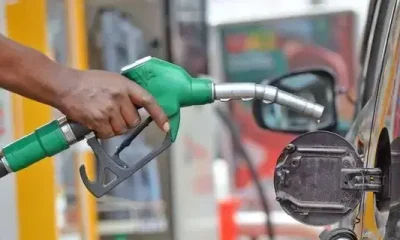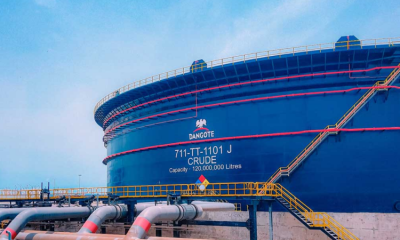
News
Aliko Dangote Exposes Oil Industry Mafia

iexclusivenews – Aliko Dangote, Africa’s wealthiest entrepreneur and president of the Dangote Group, has sent shockwaves through Nigeria’s oil industry by exposing the formidable power of what he calls the “oil industry mafia.”
In a riveting 25-minute interview with Bloomberg Television, Dangote drew a startling comparison, asserting that this shadowy group wields more influence than notorious drug cartels, raising serious questions about the challenges facing Nigeria’s petroleum sector.

Table of Contents
Aliko Dangote Exposes Oil Mafia
This online news media reports that the billionaire industrialist didn’t mince words when he declared, “I never knew that the oil industry mafia is stronger than the drug cartel.”
This bold statement has ignited a firestorm of speculation and concern among industry observers and the Nigerian public alike.

Dangote’s comparison highlights the deeply entrenched interests and potential obstacles facing attempts to reform Nigeria’s crucial oil sector.
Despite the daunting presence of this alleged mafia, Dangote remains optimistic about the prospects of his own refinery project.
He revealed that negotiations with the Federal Government regarding petroleum product pricing, particularly for Premium Motor Spirit (PMS), are nearing completion.
This development could mark a significant shift in Nigeria’s fuel market dynamics.
“We will definitely strike a deal,” Dangote confidently stated, referencing ongoing talks with authorities.
He hinted at an imminent announcement, possibly as soon as October 1st, suggesting that a “very, very clean agreement” is on the horizon.
Aliko Dangote Promises Lower Petrol Price

In a move that could potentially disrupt the status quo, Dangote expressed his willingness to sell fuel at lower prices to Nigerian consumers.
“Well, yes, most likely,” he responded when questioned about this possibility. This commitment, if realized, could bring much-needed relief to millions of Nigerians grappling with high fuel costs.
Dangote’s refinery boasts an impressive capacity that exceeds Nigeria’s consumption needs by nearly twofold.
This surplus capacity positions the Dangote Group to potentially become a major player not just in the domestic market, but also in the regional petroleum products trade.
The industrialist also highlighted a key advantage of his refinery: the ability to accept local currency for fuel purchases.
This contrasts with the current system, where Nigeria’s reliance on imported fuel necessitates transactions in foreign currencies, primarily US dollars.
Dangote explained, “Right now they won’t be able to sell cheaper because they will not be able to take local currency. We’ll take local currency.”
This revelation comes at a critical time for Nigeria’s oil industry. The country, despite being Africa’s largest oil producer, has long struggled with a paradoxical situation where it exports crude oil but imports refined petroleum products.
This arrangement has left the nation vulnerable to global oil price fluctuations and currency exchange rate volatility.
Dangote’s statements have reignited debates about the need for transparency and reform in Nigeria’s oil sector.
The alleged existence of a powerful “oil industry mafia” raises concerns about potential resistance to changes that could benefit the broader Nigerian population.
Industry experts are now closely watching how established players in Nigeria’s oil sector will respond to Dangote’s assertions and the potential entry of his refinery into the market.
Some analysts suggest that the introduction of a major new player could lead to increased competition and potentially lower prices for consumers.
However, skeptics caution that the road ahead may not be smooth. The entrenched interests Dangote alludes to could pose significant challenges to his plans.
The coming months will likely see intense negotiations and possibly power struggles as the landscape of Nigeria’s oil industry potentially shifts.
As Nigerians eagerly await more details about the agreement between the Dangote Refinery and the government, many are hopeful that this development could mark the beginning of a new era in the country’s energy sector.
The prospect of domestically refined petroleum products, sold at potentially lower prices and in local currency, holds the promise of greater economic stability and reduced vulnerability to external shocks.
Aliko Dangote’s revelations have undoubtedly stirred the pot in Nigeria’s oil industry. As the situation unfolds, all eyes will be on how this clash between a new, powerful entrant and the established “oil industry mafia” plays out.
The outcome could have far-reaching implications not just for Nigeria’s energy sector, but for the country’s economy as a whole.

























